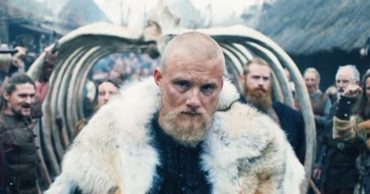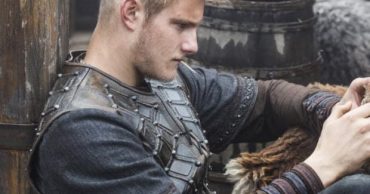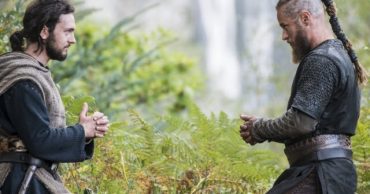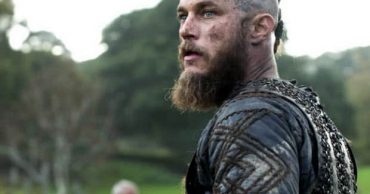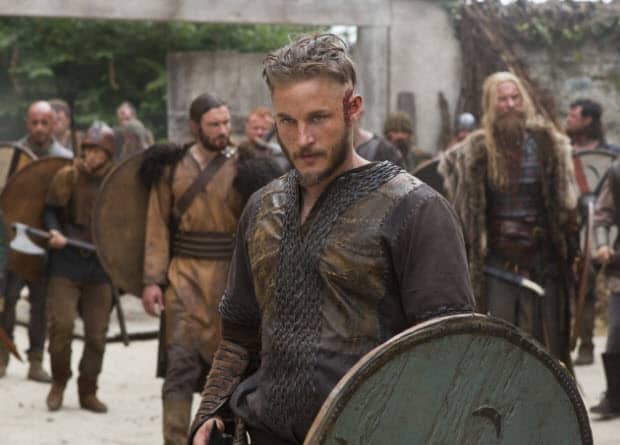
Four years later…
It’s a fairly lengthy time jump to make, especially in a series like Vikings in which even the slightest advancement in technology can make all the difference in warfare. That was what struck me when Ragnar and co. sailed onto the shores of Wessex – in all this time, what new discoveries are being made? What modifications to weaponry can be seen? Is it enough for our vikings to have their primitive shields, swords, axes and bows and expect to postpone their trips to Valhalla? After all, the Wessex soldiers have chain mail, which will probably just be one of the first of many differences we see between the warring factions this season. The point here is that Vikings doesn’t simply throw together some good fight scenes involving characters that Michael Hirst has made us care about. It also gets us invested in the world and forces us to ask these kinds of questions.
What’s more, the camera – as I mentioned in last week’s review – seems to linger on things in this world in a way that invites the viewer into it. Instead of glossing over the voyage across the waters, we get a believable and difficult sequence that separates some of the Nordic group from each other. Without taking anything away from another series, it’s interesting to compare something like this with Starz’s swashbuckling series Black Sails in how each show handles its visual storytelling alongside exposition. You’d figure a pirate series would spend a lot of time out at sea, but it’s Vikings that goes the distance in showing us that just getting from point A to point B isn’t a given. Vikings also spends an admirable amount of time with its gaze focused on its surroundings, featuring scenes where the characters are mostly silent, such as the calm before the climax in “Invasion” as the vikings are eating from the Wessex land. It helps that the locations are beautiful to look at, but other shows have less confidence when it comes to the descriptions that appear in-between exchanges of dialog in their scripts.
That’s not to say that the dialog isn’t there in “Invasion.” There’s plenty of interesting material here on the character level, not least of which is how Rollo is doing as the village drunk. With the help of Siggy, who is not content to be lost in obscurity, Rollo confronts Ragnar and earns a spot back in his good graces. He isn’t allowed to go on the raid, but he’s the Earl’s brother once again. Seeing his near-breakdown before mustering the courage to approach Ragnar, it’s difficult to feel frustrated by how repetitive his story has been in the past. And even though he enlists Earl Borg, also shunted by Ragnar (though reluctantly), the return to form we see in Rollo is one that feels fresh instead of familiar. Fraternity is obviously a core concept in this series that deals so much with male camaraderie, and despite the unlikely event that Rollo and Ragnar team up again any time soon, that relationship is central to this series. There’s an out-of-place line in “you broke my heart,” which Ragnar says to Rollo (out-of-place not just because of the Godfather evocation, but because it’s too recognizably English). But the sentiment makes a lot of sense.
Vikings, however, is not entirely guided by masculinity. Even without Lagertha’s presence in “Invasion,” the strength of the female characters in this series is on display. Aslaug still needs some more time before she feels like she belongs here, but her intelligence is evident. She immediately catches on when Ragnar is eyeing a younger girl. Whether or not Ragnar actually has intentions there is certainly up for debate (I’m of the opinion that Ragnar isn’t that interested in females outside of a superficial sphere, unless, like Lagertha, they can hold their own in combat), but Aslaug appears to suspect Ragnar’s wandering eye and delivers him a prophecy. The mystic powers in Vikings function a lot like they do in The CW’s Reign – there’s enough of a tease to get viewers interested without going overboard with things that are outside of our main character’s control. Ragnar recognizes this aspect of his world, but he also is keen to ignore it and/or manipulate it when it suits him, as he did when Rollo received his sentence “from the gods” in last week’s premiere.
“Invasion,” thankfully, also reminds us why Athelstan is so important to this story. Aside from the practical aspect of being able to communicate with people on the British Isles, his growth is something Ragnar takes very personally. Ragnar was, at first, just amused by his priest companion. Now, their bond is as strong as just about any other one in Vikings, for which we see several payoffs in “Invasion,” including Athelstan having Ragnar’s back in battle. Ragnar trusts Athelstan more than he does Rollo, and he values Athelstan’s opinion ahead of any of his kinsmen. Now that we’re back in England for a bit (the menacing introduction to King Ecbert, who is apparently similar to Ragnar, creates some great anticipation), I’m looking forward to seeing Athelstan revert back to his position as the second character in this series at Ragnar’s side.
[Photo via Jonathan Hession/History]
 Follow Us
Follow Us


